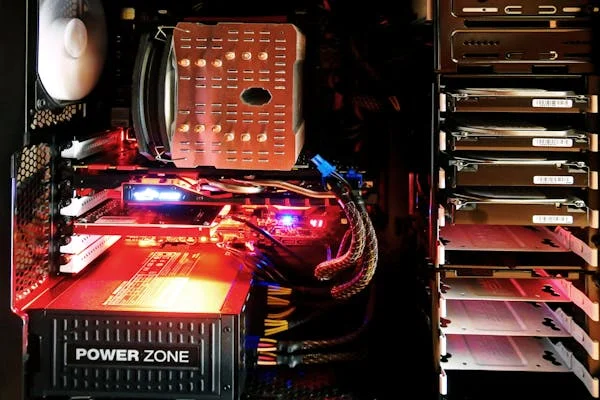The shift towards decentralized computing marks a significant change in the digital sector, moving from centralized to distributed control to improve transparency, efficiency, and resilience. These networks are becoming fundamental for managing secure, autonomous data transactions and interactions.
At the core of this shift is advanced computing, which boosts the performance and scalability of decentralized networks to meet increasing demands. These systems thrive on decentralization, using novel technologies to tackle intricate challenges without traditional central structures.

Core Technologies Enabling Advanced Computing
At the foundation of decentralized ecosystems lie a suite of advanced tools and protocols that facilitate seamless interactions and computational processes. One of the pivotal components is the Wasm client, which plays a critical role in executing decentralized applications efficiently. Wasm enhances the development environment by supporting consistent performance across different platforms, which is vital in decentralized networks where system interoperability is essential.
Wasm also enables secure execution by isolating computational processes, preventing malicious code from compromising the system. These features make it indispensable for powering decentralized networks, which require both flexibility and rigorous security measures. Technologies like Wasm, alongside blockchain protocols and cryptographic methods, are vital for ensuring secure and trustworthy operations within decentralized networks.
Smart Contracts and Their Role in Automation
Smart contracts are changing decentralized systems by automating agreements that execute based on specific conditions, which improves accuracy and reduces the need for manual control. Their adoption is rapidly increasing due to their reliability and efficiency.
The smart contracts market, with a value of $1.71 billion as of 2023, is becoming crucial across various industries. Their capability to streamline processes, boost security, and cut costs is evident in applications from supply chain automation to complex financial dealings.
Frameworks like Solidity and Rust provide essential tools for developers to craft these applications, with the expanding market further boosting the demand for capable smart contract solutions.
Consensus Mechanisms for Secure Decision-Making
Decentralized networks depend on consensus mechanisms for transaction validation and ledger accuracy. These models help network participants agree on updates without a central overseer. Traditional models like Proof of Work (PoW) have been fundamental, but newer models like Proof of Stake (PoS) are now altering the operational landscape.
PoS is becoming a preferred model as it is less energy-intensive than PoW. Participants stake their digital currency to validate transactions, aligning their financial interests with the network’s success and minimizing environmental impact.
Newer models like Delegated Proof of Stake (DPoS) and Practical Byzantine Fault Tolerance (PBFT) enhance the speed and capacity of these systems, enabling them to handle more transactions securely and efficiently.
Scalability Challenges and Solutions
Scalability represents one of the most significant challenges for decentralized ecosystems. As these networks grow, they face increasing pressure to process transactions quickly and efficiently. Without addressing scalability, networks risk becoming slow and expensive, undermining their ability to compete with traditional systems.
Advanced computational strategies like sharding are being developed to address network congestion. Sharding divides the network into smaller parts, or ‘shards,’ each handling a fragment of the total load, thereby improving transaction speed by spreading tasks across numerous nodes.
Parallel processing is another strategy that enhances the capability of decentralized networks to manage a higher volume of transactions simultaneously, which maintains performance levels and supports scalability in dynamic conditions.
Privacy and Security in Decentralized Computing
In decentralized systems, protecting privacy and securing sensitive data and assets are of utmost importance. Advanced computing addresses these issues through sophisticated techniques such as Zero-knowledge proofs (ZKPs), which allow the validation of transactions without revealing any confidential information.
Secure multiparty computation (SMPC) is another significant advancement in protecting privacy. It allows various parties to jointly compute a function while keeping their inputs hidden, safeguarding sensitive information. This is crucial in sectors like finance and health where privacy is paramount.
Decentralized networks also focus heavily on security by utilizing cryptographic methods and robust consensus models. These systems ensure the security of transactions and protect against potential compromises by malicious entities, combining privacy-centric technologies with strong security measures to provide a safe and reliable environment.

The Future of Advanced Computing in Decentralized Ecosystems
Advanced computing is becoming crucial for the development of decentralized systems, enhancing their functions and future prospects. The latest discussions focus on Wasm clients, scalable frameworks, and privacy-centered methods, illustrating the impactful role of advanced computing in this area.
These innovations address current obstacles while setting the foundation for a future driven by decentralized systems across various sectors. Through secure, effective, and expandable solutions, advanced computing positions these networks at the cutting edge of technology.
Grasping these advancements is critical for anyone involved in the ever-evolving field of decentralized systems. As these systems expand, they offer new opportunities for worldwide cooperation and advancement.





